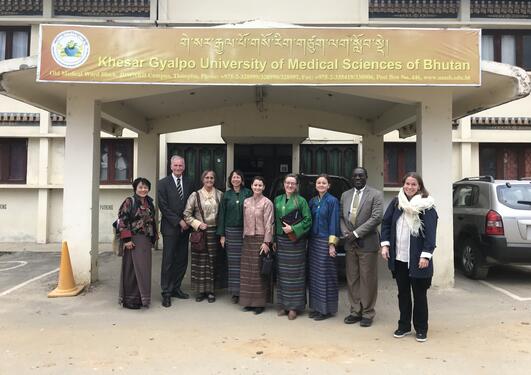Establishing the groundwork for a new international partnership
One of the CIH’s most important resources is the many long-term, stable, productive partnerships Centre researchers have been able to establish with researchers and institutions in Africa and Asia.

Main content
Establishing such research partnerships takes time. Recently, researchers from CIH’s Global Mental Health research group (GMHRG) hosted a meeting with two researchers from Bhutan about establishing possible future collaborations.
CIH has not yet had any collaborations with Bhutan, a small, landlocked country located in the Eastern Himalayas. It has a population of less than 1 million, and unlike many of its neighbours and despite being situated on the ancient Silk Road, the country has never been colonized.
From visiting students to partners
Two Bhutanese, Kinley Gyaltshen, Dean, Faculty of Health and Public Health, KGUMSB, and Ugyen Dem, Jigme Dorji Referral Hospital, Thimpu, were recently in Bergen to attend a course with Professor David Sam. GMHRG member, Solveig Kolaass, has been involved with researchers and mental health workers in Bhutan. Last spring Dr Neyzng Wangmo, from the Medical Education Centre for Research Innovation and Training in Bhutan, visited CIH. Learn more.
Building a foundation
At the meeting, Gyaltshen, Dem and members of GMHRG presented their respective research environments, and discussed potential funding mechanisms and teaching frameworks for working together in mental health education. In addition to various ERASMUS options, they discussed the Global Credit Mobility Fund, the Institutional Development Fund and the Capacity Development Fund. However, the partnership is not a very good fit for the requirements for the last three.
Bhutan has one university, the Royal University of Bhutan, which has a decentralised structure, with eight constituent colleges and one affiliated college. CIH Professor Ingunn Marie S. Engebretsen, and leader of GMHRG, explained that the university uses a “non-European” curriculum, which will present some challenges if the collaboration seeks EU funding for future education and training activities in the area of mental health.
It’s a start!
The meeting participants agreed to meet again for further strategic discussions. There is a large unmet need for competent mental health workers in Bhutan. There are very few qualified people, and some of these will shortly retire. The Bhutanese and Norwegians plan to continue meeting, sharing experiences, discussing needs and funding opportunities – a new CIH partnership is beginning!
